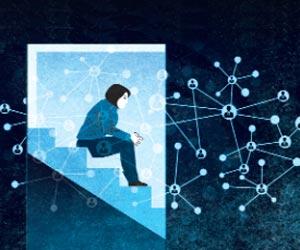Last weekend, my mother and my 7-year-old niece had come to my place. I have a new candle-holder which rotates and casts bird shapes around us on the wall


Illustration/Ravi Jadhav
![]() Last weekend, my mother and my 7-year-old niece had come to my place. I have a new candle-holder which rotates and casts bird shapes around us on the wall. My niece insisted that she is old enough to light matches and lit it. We turned off the lights and sat quietly in the embrace of bird-shadows. Suddenly, my niece asked me: Maasi, when you go to sleep at night, you don't feel alone?
Last weekend, my mother and my 7-year-old niece had come to my place. I have a new candle-holder which rotates and casts bird shapes around us on the wall. My niece insisted that she is old enough to light matches and lit it. We turned off the lights and sat quietly in the embrace of bird-shadows. Suddenly, my niece asked me: Maasi, when you go to sleep at night, you don't feel alone?
ADVERTISEMENT
Surprised, I laughed and said I didn't. "But, you stay on your own na," she persisted. "Yes, I do." "Then?" she asked. I struggled to explain. "When I'm about to sleep I think of you and I feel happy and when you're happy you don't feel alone" I tried. She said nothing, not entirely convinced but thinking it over. It's not a very understandable thing for a little girl who has grown up always surrounded by people why physical solitude is not scary if it does not symbolise an emotional loneliness.
But, we do live in times when loneliness is considered an epidemic. Britain has just appointed a minister for loneliness. Studies find that loneliness is caused not by living on your own, but a sense of isolation, a lack of connection with the world. Married people who don't have any friends, for instance, were found to be acutely lonely — pointing to the fact that we need to be more than just our social roles. Loneliness runs deep among young people today who are widely networked but in a context when competitiveness, social media, and filter bubbles, makes the world seem more homogenous and demanding conformity while espousing individualism. Connecting to our own selves, and so, to others becomes harder.
In India it is an oddity to live on your own and I am often asked the question that conflates being alone with loneliness. Quite apart from the fact that I am one of those people who needs substantial alone time, I think India, for all its matrimonial mania, has a more emotionally sustainable culture of compulsive connection. We have an informality in friendships, a need to over-share, an insistence on arguing and interfering, a sense of that untranslatable word, apnapan, with others not related to us, which is a luxurious emotional habitat, even in these polarised times.
The incidence of mental illness and isolation is undeniably growing around us. But often I have felt it possible to be intrusive and hence intervene, when I sensed depression in a friend. Recently, I got a Facebook message about someone (whom I did not know) who had posted suicidal comments on his wall and was not answering his phone from someone concerned about him. In a few hours, someone had gone to his house to make sure he was alright.
Sometimes, Indian intrusiveness and disrespect for private space can be exasperating. At other times like the one above, it is a lifesaver.
Recently, while at a café with a friend, a French woman, said to us: you know what I like about Indians? You still have so much to tell each other. We were startled but touched by the beauty of this idea. It is true — the ability to disclose ourselves to others, and so, admit our selves to ourselves, and remain connected, is what keeps loneliness in its place.
Paromita Vohra is an award-winning Mumbai-based filmmaker, writer and curator working with fiction and non-fiction. Reach her at www.parodevipictures.com
Catch up on all the latest Mumbai, National and International news here
Download the new mid-day Android and iOS apps to get updates on all the latest and trending stories on the go
 Subscribe today by clicking the link and stay updated with the latest news!" Click here!
Subscribe today by clicking the link and stay updated with the latest news!" Click here!







